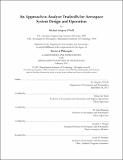| dc.contributor.advisor | Olivier de Weck and R. John Hansman. | en_US |
| dc.contributor.author | O'Neill, Michael Gregory | en_US |
| dc.contributor.other | Massachusetts Institute of Technology. Department of Aeronautics and Astronautics. | en_US |
| dc.date.accessioned | 2013-06-17T20:05:29Z | |
| dc.date.available | 2013-06-17T20:05:29Z | |
| dc.date.copyright | 2013 | en_US |
| dc.date.issued | 2013 | en_US |
| dc.identifier.uri | http://hdl.handle.net/1721.1/79340 | |
| dc.description | Thesis (Ph. D.)--Massachusetts Institute of Technology, Dept. of Aeronautics and Astronautics, 2013. | en_US |
| dc.description | This electronic version was submitted and approved by the author's academic department as part of an electronic thesis pilot project. The certified thesis is available in the Institute Archives and Special Collections. | en_US |
| dc.description | Cataloged from department-submitted PDF version of thesis. | en_US |
| dc.description | Includes bibliographical references (p. 181-189). | en_US |
| dc.description.abstract | There are important tradeoffs that need to be considered for the design and operation of aerospace systems. In addition to tradeoffs, there may also be multiple stakeholders of interest to the system and each may have different preferences as to the balance amongst the tradeoffs under consideration. A tradeoff hyperspace is created when there are three or more tradeoff dimensions and this increases the challenge associated with resolving the hyperspace in order to determine the best design and operation of a system. The corresponding objectives of this research are to develop a framework to analyze tradeoff hyperspaces and to account for the preferences of multiple stakeholders in this framework. The framework developed in this research is called the Tradeoff Analysis Framework and its applicability was evaluated through analyzing three different case studies in the aerospace domain, each progressively more complex in terms of applying the framework and exploring the impact of certain types or change, or innovation in the system of interest. The first case study analyzed the impact of changing aircraft cruise operations and one facet of the case study explored the impact of imposing a hypothetical tax on aircraftproduced contrails. From this study it was determined that airlines will change their behavior (i.e., their perceived value-optimal cruise trajectory) in response to a tax placed on producing contrails where, the higher the tax, the less contrails they choose to produce. The second case study explored the impact of changes in aircraft approach procedures into Boston-Logan airport. In this study, there were multiple stakeholders, each with different preferences as to the balance amongst the performance and environmental tradeoffs considered. A key result from this study was that competing stakeholder preferences could be partially resolved, which led to the design new approach procedures that were beneficial to all stakeholders. The third and last case study examined the tradeoffs associated with using fractionated spacecraft for remote sensing space missions. Here, the current paradigm is monolithic spacecraft and it was found that despite fractionated spacecraft demonstrating more value-robustness than a comparable monolith, they fail to stay value-competitive to monoliths in terms of absolute value delivered. In particular, this occurs because presently the enabling technologies required for fractionated spacecraft are not yet mature and reliable enough at the performance levels needed for them to become viable alternatives to monoliths. Along with insights gained in the case studies about the systems of interest, through applying the Tradeoff Analysis Framework insights were gained with respect to implementing the framework. These insights form the methodological contributions of this research since they offer opportunities to learn about the breadth of potential framework applicability and areas for subsequent improvements in the framework for future use. | en_US |
| dc.description.statementofresponsibility | by Michael Gregory O'Neill. | en_US |
| dc.format.extent | 201 p. | en_US |
| dc.language.iso | eng | en_US |
| dc.publisher | Massachusetts Institute of Technology | en_US |
| dc.rights | M.I.T. theses are protected by
copyright. They may be viewed from this source for any purpose, but
reproduction or distribution in any format is prohibited without written
permission. See provided URL for inquiries about permission. | en_US |
| dc.rights.uri | http://dspace.mit.edu/handle/1721.1/7582 | en_US |
| dc.subject | Aeronautics and Astronautics. | en_US |
| dc.title | An approach to analyze tradeoffs for aerospace system design and operation | en_US |
| dc.type | Thesis | en_US |
| dc.description.degree | Ph.D. | en_US |
| dc.contributor.department | Massachusetts Institute of Technology. Department of Aeronautics and Astronautics | |
| dc.identifier.oclc | 845085104 | en_US |
